Ingmar Bergman’s Wild Strawberries follows one day of an elderly man trying to reevaluate his life. Professor Isak Borg is about to receive an honorary award for 50 years of medical practice. It recognizes his success in his career, but was he successful in life in general?
Bergman directed Wild Strawberries in 1957 when he was 39, having written the script while hospitalized and recovering from a serious illness that his doctor eventually concluded to be psychosomatic. Wild Strawberries reflects much of Bergman’s personal struggles. But Victor Sjöström, the legendary director and actor of Swedish silent cinema who plays Professor Borg, brings in his own personality. Bergman even believed that this film came out to be more of Sjostrom’s than his. Sjöström was 78 during filming the same age as his character. And was constantly fighting his own demons and fears, complaining that he didn’t really want to do it, that he was old and just could not do it anymore. So, here we have a 38-year-old director and a 78-year-old actor making a film about a 78-year-old man with a 38-year-old son, trying to make sense of life.
Professor Isak Borg is travelling from his home in Stockholm to Lund where the ceremony is to take place. This is a journey that takes place in two different dimensions: one is conscious, fixed in time—from early morning to the evening of one day; and another is unconscious, in a timeless space of dreams and memories. This timelessness even has a specific symbol in the film—clocks without hands.
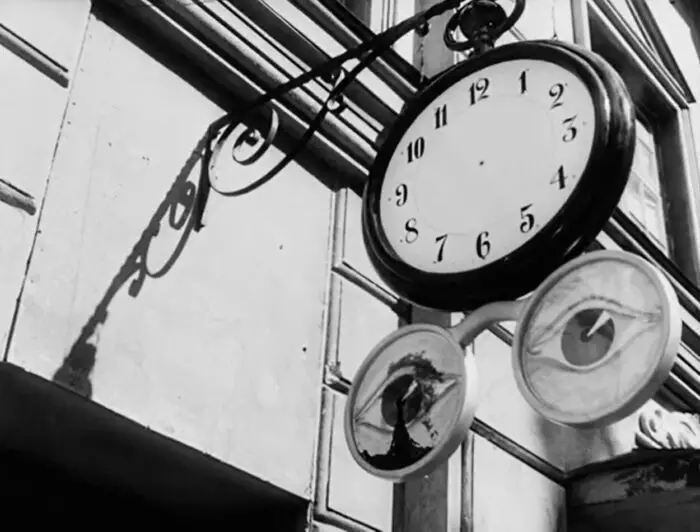
Isak’s reevaluation has specific triggers. One is, again, the real-life trigger caused by the award, the recognition of his work. The other is internal, unconscious trigger—the dream.
This dream prompts Isak to choose to drive to Lund instead of taking a train, as he had been planning. Thus he is able to make several stops on the way and visit the meaningful places of his past. Isak is accompanied by his daughter-in-law, Marianne (played by Ingrid Thulin), whose attitude to him changes throughout the film, reflecting the change happening in Isak.
Isak makes his first stop at the house he used to spend summers first 20 years of his life. He is immersed in his memories of childhood. We see it as if he enters them and watches the scenes from the everyday life of the family on vacation. Life is easier when we are children and we have almost no responsibilities and no social obligations.
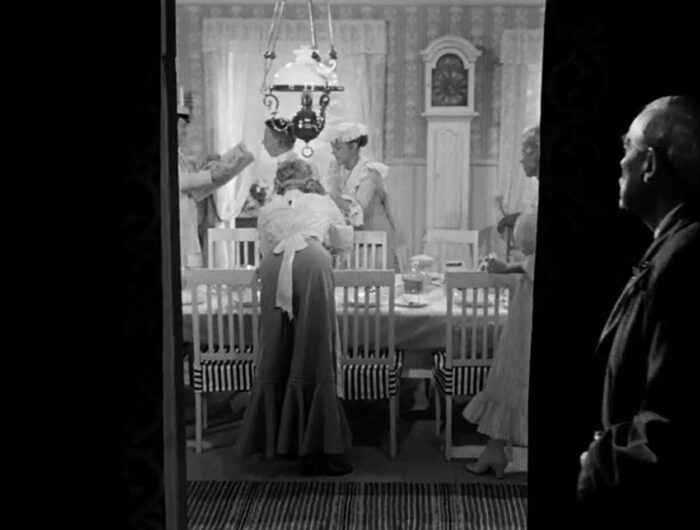
The wild strawberry patch in front of the house reminds Isak of Sara, his lost love who married his brother Sigfrid. In Isak’s memory, Sara is collecting strawberries for her uncle’s birthday. Sigfrid interrupts her and kisses her, even though he knows she’s engaged to his brother. Sara is upset, feeling that she is betraying Isak. But we know that eventually she chose Sigfrid anyway. It seems like the innocence of those days and faith in love disappeared with the loss of Sara. Young and romantic Isak who loved poetry and believed in God turned into an intellectual professor who prefers to live in solitude, far from people and their drama. His unhappy and loveless marriage produced a son who doesn’t want to have children to stop passing on his own misery.
Isak and Marianne pick up passengers on their way. These strangers, although real people, also serve as projections of Isak’s mind, reminding him about various people in his life. The first group is a cheerful young woman, Sara, and her two friends, Anders and Victor. Bibi Andersson plays both Isak’s sweetheart Sara and hitchhiker Sara.
Sara is a source of love and life in Isak’s memories and this new Sara plays that role during the journey. Anders and Victor are both in love with her and she has to choose between them. Anders is a romantic young man going to be a minister and interested in poetry, just like Isak used to be when he was engaged to his Sara. Victor is going to be a doctor, the profession to which Isak dedicated himself when he lost Sara, and I suppose lost his faith too. They are like Isak’s own personalities competing with each other.
But Sara is also the one who forces Isak in his dream to face his old age and approaching death. Though it’s not just the age these dreams are warning him about. They make Isak face the fact that he has been avoiding life all this time. He finally recognizes it:
I’ve had the weirdest dreams, as if I must tell myself something I won’t listen to when I’m awake… That I’m dead. Although I’m alive.
Other passengers are a married couple, the Almans, whose toxic and mutually humiliating relationship reminds Isak of his own marriage. It’s not surprising that the couple appears in Isak’s second dream where he is on the exam and Alman is the examiner. In this dream, Alman gives his verdict to Isak: he is found incompetent. Isak is also accused to be guilty of guilt, and his wife accuses him of callousness, selfishness, and ruthlessness. Lots of accusations. And the punishment for all this is loneliness.
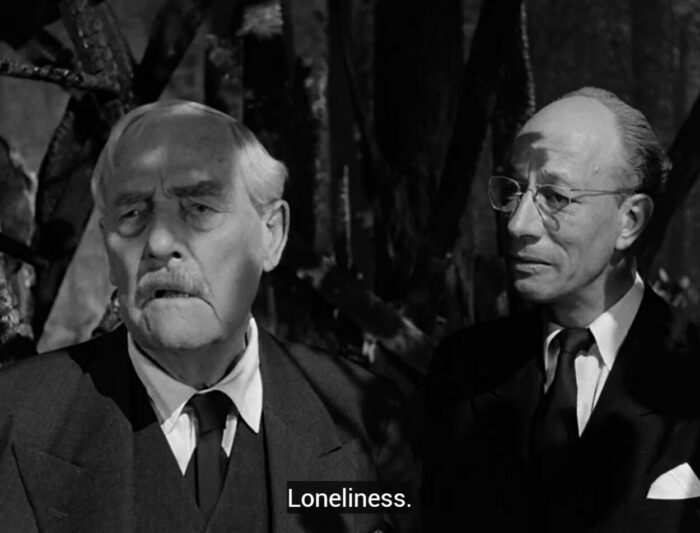
The second stop on Isak’s journey is his home town where his mother still lives, a 96- year-old woman who lives alone in the shadows of her past life. She keeps all the memories of her ten children and many grandchildren. And here materializes Isak’s dream from the beginning of the day. Mother shows him a watch without hands. This watch connects everything: it’s Isak’s father’s watch, his mother is going to give it as a present to one of her grandchildren, the one who was a baby 50 years ago when Sara was looking after him that same summer when she left Isak. Mother’s house is also like a timeless space, as is his dream or his memories. Everything is as alive, or dead, as was 50 years ago. There are no boundaries between past and present, or life and death.
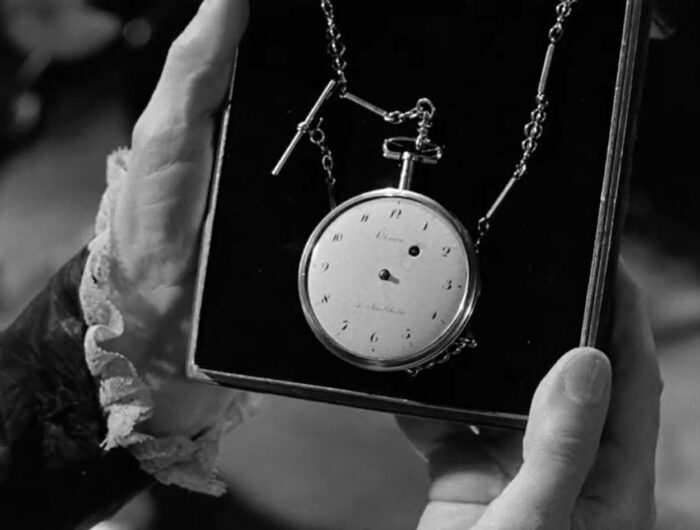
Isak’s mother lives alone too. Although she has so many children and grandchildren, none of them visit her, except Isak. There is a big contrast between this elderly woman who gave birth to ten children but is lonely anyway, and Marianne, a young woman, who has no children yet and has to fight against the coldness and loneliness that seems to be passing from generation to generation in her husband’s family. Marianne is pregnant and faces the need to choose between the child and her husband, or we can say, between life and death. At the end of the film, we glimpse hope, the possibility that the child and life are probably going to win.
The journey, eventually, comes out to be helpful. Isak is able to face his “incompetence” and loneliness and starts making changes by accepting other people. But the most important changes are always internal. There is something symbolic in the scene where the trio of hitchhikers sings him a serenade. Sara declares that she chooses him among them all—something that Isak would’ve been happy to hear from his sweetheart Sara 50 years ago. But it sounds as if he recovered his lost love, symbolically speaking. Interestingly, she chooses a more complete version of Isak over the split, conflicting versions of his youth. He probably deserves her love now.
Isak’s last fantasy is peaceful and calming. Sara is happy and welcoming in it, and helps him to find his parents. Finding parents is also something that must’ve been troubling Bergman himself. He had a difficult relationship with his parents, especially his father, with whom he came to terms only after the death of his mother. But in the time when this film was made, the relationship was turbulent, or maybe non-existent at all. So perhaps, the idyllic image of parents was Bergman’s own peaceful fantasy.
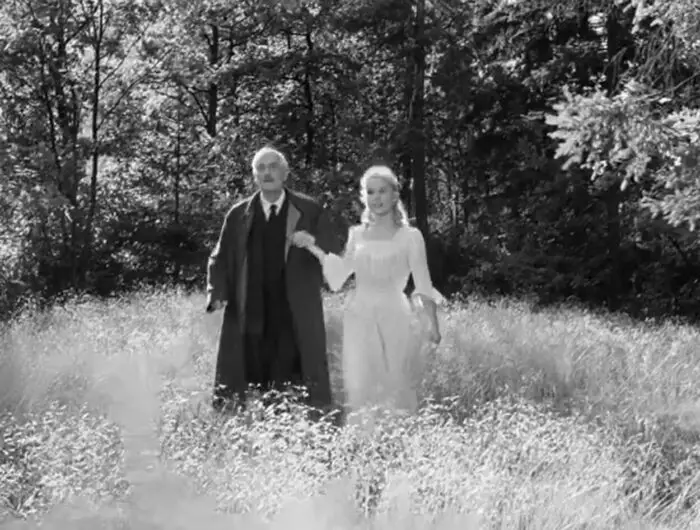
Isak finally finds peace. I hope that his peace lasted to the end of his life and that Evald’s and Marianne’s marriage was indeed saved by the coming child.
Good things and bad things happen in our lives. Some of them may be so painful that we choose to face away and forget them, and they stay there sucking our life force. But we often dismiss small, seemingly unimportant things too, like wild strawberries. They are transient but can bring joy and actually keep life in us. It’s important to remember them. We can always find a place for them in those parts our mind and soul where time simply doesn’t exist.


